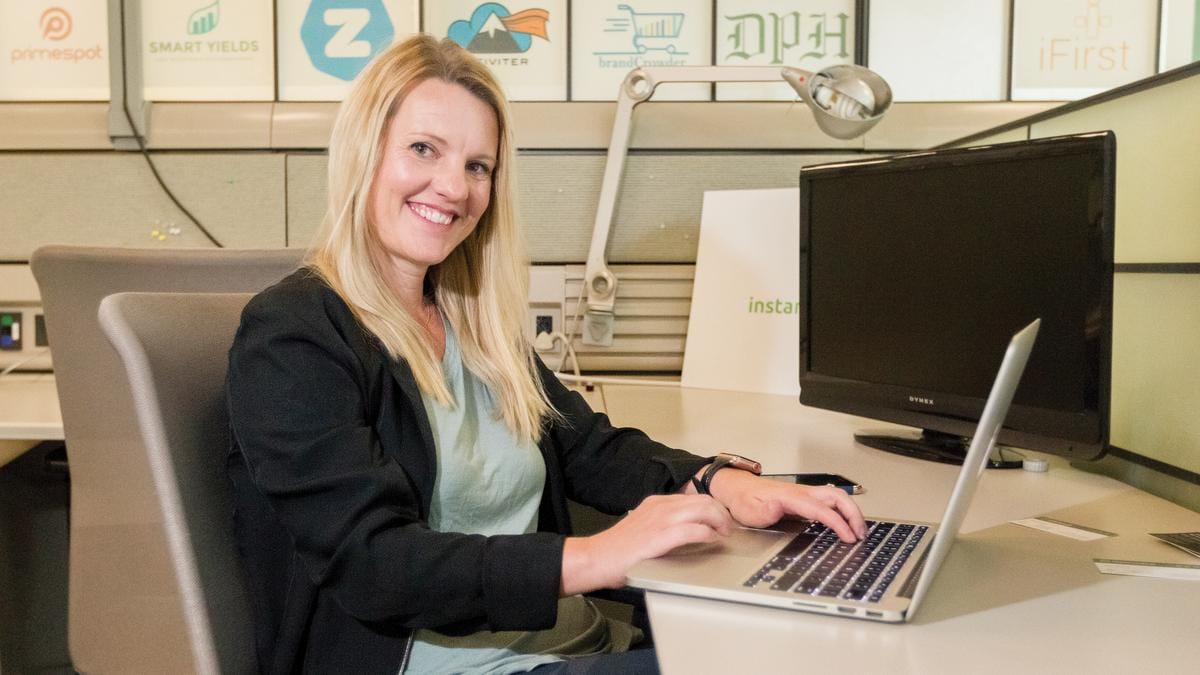The startup world thrives on innovation. Founders pour their hearts and souls into groundbreaking ideas, disrupting industries and dreaming of billion-dollar valuations. But when it comes to securing venture capital, there's a less glamorous factor that often determines who sinks or swims: grit.
Raising capital is rarely a walk in the park. It's a grueling process filled with pitches, negotiations and, more often than not, a string of rejections. While a compelling idea and a solid business plan are essential, true fundraising success requires something more — an unwavering determination to persevere.
Liza Rodewald, founder of Instant Teams, knows this firsthand.
- Fundraising success requires more than a great idea — it demands resilience, adaptability, and a relentless commitment to your vision. Liza Rodewald, founder of Instant Teams, shares how she cultivated these qualities to secure millions in funding.
- Securing venture capital is a marathon, not a sprint. Liza reveals her strategic approach to building a network, leveraging introductions, and maintaining consistent communication with investors, even after closing a round.
- Military founders possess a unique advantage in the startup world: grit. Liza offers specific advice for veterans transitioning into entrepreneurship, encouraging them to leverage their strengths and build a supportive network beyond military-specific circles.
As a military spouse, she was no stranger to navigating uncertainty and adapting to change. But when she set out to build a company that connected military spouses with remote work opportunities, she encountered a new level of challenge.
“When I became a [military] spouse, I moved six times in seven years,” Liza shared on an episode of the How I Raised It podcast. “If I was climbing a traditional corporate ladder, it's like having the ladder constantly pulled out from under you. You need some source of stability.”
Building a business while facing constant relocation would be enough to make most founders reconsider. Yet, Liza not only persevered — she thrived. She launched Instant Teams, navigated the complexities of building a two-sided marketplace, and ultimately secured millions in funding, including a significant investment from Tiger Global.
Her journey is a testament to the power of grit. It’s also a journey that holds invaluable lessons for any founder, especially those from a military background who are determined to turn their vision into reality.
Why grit matters more than you think
Ask any founder about their fundraising experience, and you'll likely hear stories of late nights, countless pitch decks and the emotional rollercoaster of navigating investor meetings. Liza’s journey, as she revealed on the podcast, was no exception.
But her story also highlights a crucial ingredient for success, one that goes beyond a brilliant idea: grit. Grit is that unwavering determination that keeps you going when the going gets tough — the ability to bounce back from rejection and keep pushing toward your goals, no matter the obstacles.
Liza's story is a powerful example of grit in action. Consider this: She dove headfirst into entrepreneurship while her husband was still on active duty in the military. It was a testament to her unwavering commitment, her deep-seated belief in her mission, and her ability to thrive in a climate of constant change.
And then came yet another relocation, this time to Hawaii in the middle of fundraising. Instead of accepting defeat, Liza embraced the challenge with characteristic optimism: “When we got orders to Hawaii, I was like, ‘Oh my gosh, this is going to be even harder. Now I'm even more out there.’”
Her determination to make it work, regardless of location, highlights a key facet of grit: adaptability. She didn’t dwell on the challenges of distance; she found ways to navigate them, ultimately tapping into the Hawaiian angel investor network and securing funding on her own terms.
This, right here, is grit in action. It's about embracing challenges, finding creative solutions and never losing sight of your goals — even when a tropical paradise throws you a logistical curveball.
How to develop grit, according to a founder who did it
Liza’s fundraising journey wasn't a straight shot to success. It was paved with challenges, rejections, and moments of doubt. But it was also a masterclass in turning setbacks into stepping stones. Here are four key lessons from her experience that can help you cultivate an investor-winning level of grit:
Step 1: Clarify your "why" — and let it fuel your fire
When you’re facing a mountain of “no’s” from investors, it’s easy to get discouraged. That’s why it’s crucial to have a crystal-clear understanding of why you’re doing this in the first place. What’s the driving force behind your business? What problem are you passionate about solving?
For Liza, it was about more than just building a successful company; it was about creating a solution for a community she deeply understood. “Our mission is to improve the financial wellness of military families through military spouse employment,” she emphasized. This clear sense of purpose fueled her determination, pushing her to keep going even when the going got tough.
Step 2: Embrace the "no" as a chance to refine your pitch
Rejection is an inevitable part of the fundraising process. But instead of viewing it as a sign of failure, successful founders use it as an opportunity for growth.
“I think I counted at least 75 ‘no’s’ along the way,” Liza revealed. “It’s not like I just got on the phone with Tiger [Global] day one of pitching and boom, I had a $13 million check.”
Liza didn’t let those "no's" derail her. She used them to refine her pitch and identify the investors who truly aligned with her vision. “It's also finding the right investor,” she explained. “I'm a marketplace, I'm a little unique. There's a service component to it. It's not pure SaaS. So getting into the right investor profile was also important and tricky."
She even made a strategic pivot, narrowing her focus to emphasize Instant Teams’ expertise in building customer support teams with military spouse talent. This shift resonated with investors who were grappling with attrition challenges in that area.
Step 3: Build a network that supports your vision
Liza understood that fundraising wasn’t just about having a great pitch. It was about building the right relationships. And this requires more than just attending a few networking events — it demands a commitment to building and nurturing a network that will support you for the long haul.
She actively sought out networks and programs that could connect her with potential investors. From participating in Founder Institute to leveraging warm introductions and navigating the nuances of the Hawaii angel investor scene, Liza showcased the importance of networking strategically and building a supportive community. “Anybody I talked to, anybody that wrote me a check, they got a monthly update. I really do think it was key to my success.” This proactive approach kept her top of mind with potential investors and built crucial trust.
“I made sure that network was really warm. I did run that whole process, and I used Foundersuite to do it.” Liza shared. “That's all I'm doing here. I'm not trying to answer emails. I'm not trying to sell something else. I'm just managing my investor network.” Using tools like Foundersuite can help founders stay organized, track investor communication, and maintain consistent engagement, even amidst the chaos of building a business.
This proactive, persistent approach is a hallmark of grit. It’s about showing up consistently — even when you're not actively fundraising — and demonstrating to your network that you’re in it for the long haul.
Importantly, this persistence pays off in the long run: "I got a call on a Friday night, about eight o'clock at night from Dave from Right Side Capital. He's like, ‘Liza, I've got an intro for you...’ So he gave me an intro to Tiger Global, and they ended up leading the round.”
Bonus advice: Navigating fundraising as a veteran founder
Liza’s experience as a military spouse gave her a unique perspective on the challenges and opportunities of the startup world. And for veterans transitioning from military service to entrepreneurship, she offered some particularly insightful advice, gleaned from her own experience raising millions in venture capital:
Don't limit yourself to military-specific networks
While there are valuable resources and investors specifically focused on supporting veteran-founded businesses, Liza encouraged military entrepreneurs to broaden their horizons.
“Don’t be afraid to go outside of those systems to start building your network,” she advised. She encouraged veterans to consider programs like Techstars, Founder Institute, and 500 Startups, emphasizing that stepping outside of a purely military-focused ecosystem can lead to valuable connections and a more diverse investor network.
Leverage the grit you already possess
Liza recognized that veterans often possess an inherent advantage in the startup world. “They just have a lot of grit. And that's one of the things that you need as a founder — the stamina, the ability to keep going,” she observed. She encouraged veterans to leverage this strength, recognizing that their experiences have equipped them with resilience, adaptability, and a commitment to the mission which are invaluable in the face of entrepreneurial challenges.
Highlight the transferable skills gained through service
While the military and startup worlds may seem vastly different, Liza emphasized the transferable skills veterans bring to the table. “They're used to quick movement, quick environments, like pivoting, solving problems, doing things like that,” she explained. “Which are all traits you do as an entrepreneur.” By highlighting these valuable skills, veterans can position themselves effectively to potential investors.
Harnessing the power of grit
From ideation to launch, and from seed funding to Series A, Liza Rodewald's journey with Instant Teams is a testament to the power of grit. As Liza put it, “If you're raising money, don't get discouraged. Keep going. There's lots of no's, but then if you just keep going, there's the breakthroughs on the other side.”
And for those with a military background, considering a leap into the entrepreneurial arena. Liza's story offers a powerful reminder: You already possess the grit needed to succeed. Embrace it, nurture it and let it guide you as you build a company that makes a difference.
This article is based on an interview between Nathan Beckord and Liza Rodewald on an episode of Foundersuite's How I Raised It podcast.


